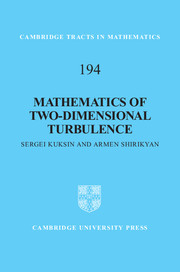4 - Ergodicity and limiting theorems
Published online by Cambridge University Press: 05 October 2012
Summary
In this chapter, we study limiting theorems for the 2D Navier-Stokes system with random perturbations. To simplify the presentation, we shall confine ourselves to the case of spatially regular white noise; however, all the results remain true for random kick forces. The first section is devoted to the derivation of the strong law of large numbers (SLLN), the law of the iterated logarithm (LIL), and the central limit theorem (CLT). Our approach is based on the reduction of the problem to similar questions for martingales and an application of some general results on SLLN, LIL, and CLT. In Section 4.2, we study the relationship between stationary distributions and random attractors. Roughly speaking, it is proved that the support of the random probability measure obtained by the disintegration of the unique stationary distribution is a random point attractor for the RDS in question. The third section deals with the stationary distributions for the Navier-Stokes system perturbed by a random force depending on a parameter. We first prove that the stationary measures continuously depend on spatially regular white noise. We next consider high-frequency random kicks and show that, under suitable normalisation, the corresponding family of stationary measures converges weakly to the unique stationary distribution corresponding to the white-noise perturbation. Finally, in Section 4.4, we discuss the physical relevance of the results of this chapter.
- Type
- Chapter
- Information
- Mathematics of Two-Dimensional Turbulence , pp. 173 - 210Publisher: Cambridge University PressPrint publication year: 2012



